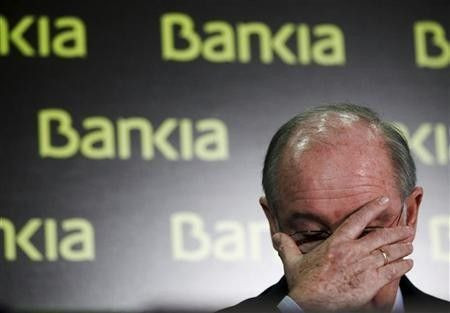Spain To Demand That Banks Recognize More Losses

(Reuters) - Spain stepped up efforts to save its troubled banks on Thursday with a plan to make them recognize huge losses from a property crash, but uncertainty over the final cost of a rescue hit the euro, Spanish debt and global stock markets.
The centre-right government will demand that banks set aside 35 billion euros ($45 billion) against loans to the moribund building sector, on top of 54 billion euros the banks are already provisioning, financial sources said late on Tuesday.
This would mark the latest in a string of reform plans in the past week which include moving toxic assets out of some banks and staging an estimated 10 billion euro state rescue of Spain's most exposed bank, Bankia (BKIA.MC).
On Friday we will deepen the process of cleaning up the banks, Prime Minister Mariano Rajoy told a news conference in Portugal, adding that other decisions could come sooner, although he did not say what they were.
Rajoy has agreed to put public funds into the banks, reversing his former promise not to do so, and the government is due to announce its plans for tackling a problem which has shaken theeuro zone at the end of the week.
Jose Ignacio Goirigolzarri met Bankia's board on Wednesday after he was formally named as its new head. Sources have told Reuters that the government could convert into equity 4.5 billion euros of rescue funds it previously injected into Bankia's parent company BFA, partly nationalizing the bank.
Spain's government and banks are belatedly recognizing a multi-billion funding gap in the financial system linked to a 2008 property crash that has heightened fears the country may need an international bailout.
It will be the fourth banking sector overhaul in three years as Spain tries to leave the crisis behind, but investors have yet to be convinced.
The yield on the Spanish 10-year benchmark bond rose to its highest level since the end of November on Wednesday, spiking up to 6.07 percent, close to levels considered unaffordable over the long term..
European shares were down .FTEU3, the U.S. stock market opened lower, and the euro moved close to a recent three-month low versus the dollar, with political turmoil in Greece and the rising costs of fixing Spain's banks deepening fears about the euro zone.
RECOGNISE MORE LOSSES
Spain wants lenders to set aside more money to protect against losses on loans that are currently sound but may slip into default in a deteriorating economy, financial sources and a government source told Reuters late on Tuesday.
The Economy Ministry declined to comment.
Some Spanish lenders are unlikely to be able to find the extra funds without public help, raising expectations the government may have to issue more debt to bail them out.
It depends what's announced, but right now it feels like smoke and mirrors and not the cathartic moment that Spain needs. It looks more like the government has panicked and pushed something out, Ben Levett, analyst at consultancy 4Cast said.
Markets have returned their focus to the funding hole at Spain's banks in recent weeks following a negative International Monetary Fund report on the sector and a Standard & Poor's credit rating downgrade.
Spain's banks have around 300 billion euros in total exposure to the building sector, including property seized as collateral, equivalent to around 30 percent of the country's gross domestic product. More than half is problematic.
The country is suffering its second recession in three years and has the highest unemployment rate in the European Union at 24.4 percent, leading more Spaniards to default on debt and spreading the rot beyond the real estate sector on banks' balance sheets.
The government will demand banks raise provisions to a level equivalent to 30 percent of loans to housebuilders, one of the sources told Reuters, up from a current 7 percent.
There's no way we can meet these provisions by ourselves - the whole sector would fall into losses, said a source at one savings bank who declined to be named.
The government accepts some banks will not be able to make the new provisions and is still working on a plan for those cases, a government source said.
BITE THE BULLET
Market watchers said Spain should bite the bullet and raise funds to solve the banking crisis, which has dragged on for three years and through two successive governments.
Even injecting the 40 to 50 billion euros analysts estimate the banks need to protect against future losses would keep Spain's ratio of public debt to gross domestic product (GDP) below 100 percent and in line with France and Germany, economists said.
The banking issue has been allowed to fester for three years. More public cash will raise funding costs for the government but it's worth the risk, said Gilles Moec, an analyst at Deutsche Bank.
Bank shares plunged as investors anticipated more losses booked against profits for lenders which have already reported sharp falls in quarterly earnings as they write down bad property investments.
Shares in Bankia, Spain's fourth biggest lender, fell 6.68 percent on Wednesday, two days after chairman Rodrigo Rato stepped down, under government pressure, to let Goirigolzarri take the helm.
The government wants Goirigolzarri to be in charge before it announces the details of the bank's rescue, a government source said.
Shares in Bankia have fallen more than 15 percent since Monday when it emerged that Spain was readying a bailout for the bank, which holds 10 percent of the banking system's deposits.
We consider it an initial positive sign that Spain is getting on with further action on banks' balance sheet clean-up, albeit we believe late action is costing the country dearly, said Mediobanca in a research note.
($1 = 0.7695 euros)
--
© Copyright Thomson Reuters 2024. All rights reserved.





















